Witness the profound spiritual symbolism of corn in the Bible, unveiling divine provision, faith, and life's cycles.
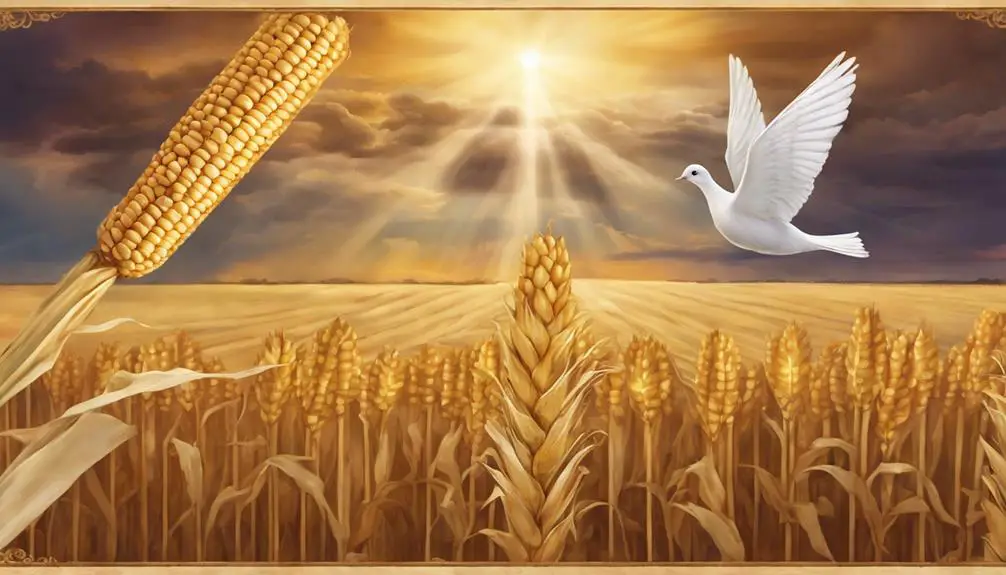
Spiritual Meaning of Corn in the Bible
Just as manna once fell from heaven to feed the Israelites, corn, or grain as it is more accurately referred to in biblical contexts, serves as a symbol of divine provision and sustenance throughout the Bible. You'll find its significance woven into Joseph's story of survival and foresight, parables that teach life-changing lessons, and harvest celebrations that underscore faith and gratitude.
But to fully grasp the spiritual lessons corn imparts, you must look beyond its physical nourishment. The stories and symbols associated with this humble grain hold deeper meanings about provision, faith, and the cycles of life and death, inviting you to explore a rich tapestry of spiritual insights.
Key Takeaways
- Corn symbolizes divine provision, showcasing God's sustenance and care for His people through agricultural blessings.
- In Joseph's story, corn embodies providence, economic foresight, and the themes of perseverance and reconciliation.
- Biblical parables utilize corn imagery to convey spiritual lessons of growth, self-sacrifice, and the importance of ethical living.
- The cycle of sowing and reaping corn teaches spiritual principles of cause and effect, highlighting the importance of kindness and generosity.
Corn as Divine Provision
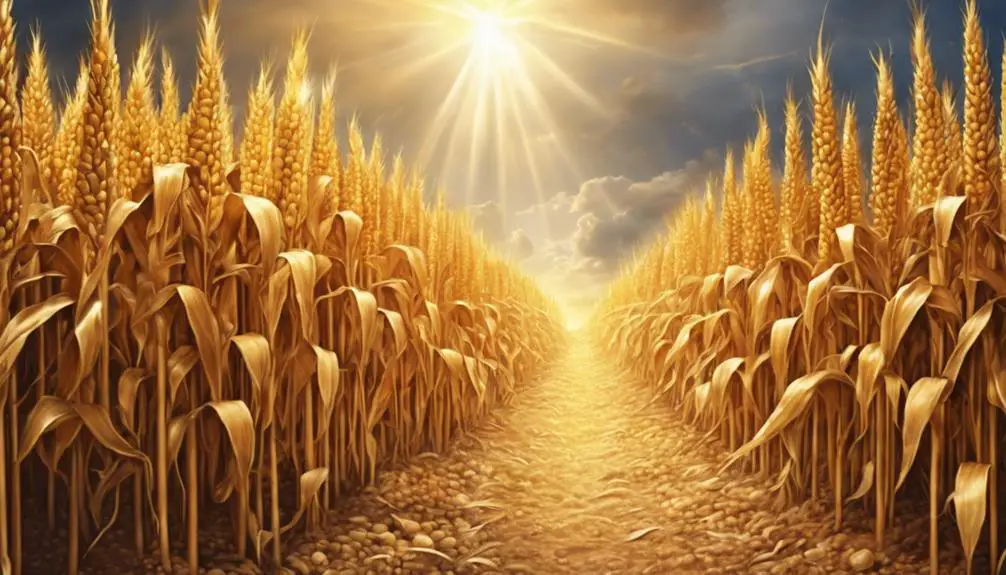
Corn symbolizes divine provision in the Bible, illustrating how God sustains and nourishes His people through times of abundance and need. This motif of corn abundance serves as a potent symbol of agricultural blessings, highlighting the intimate relationship between divine favor and the fertility of the land. You'll notice that in scriptural narratives, corn isn't merely a crop; it's a signifier of God's ongoing care and provision for His people.
Analyzing biblical references to corn, it becomes clear that this grain isn't just a physical sustenance but also a metaphorical one. It represents the spiritual nourishment that God provides to those who follow Him. In times of scarcity, the emergence of corn signifies hope and renewal, a reminder that God's providence is unfailing. Conversely, during periods of plenty, corn abundance embodies the overflowing blessings bestowed upon individuals and communities who remain faithful.
This intricate linkage between corn and divine provision underscores a broader theological theme: God as the ultimate source of all blessings, both spiritual and material. Agricultural blessings, therefore, aren't merely the result of human labor but are seen as manifestations of God's grace. This perspective encourages a deeper appreciation of the natural world as a conduit of divine generosity.
Symbolism in Joseph's Story
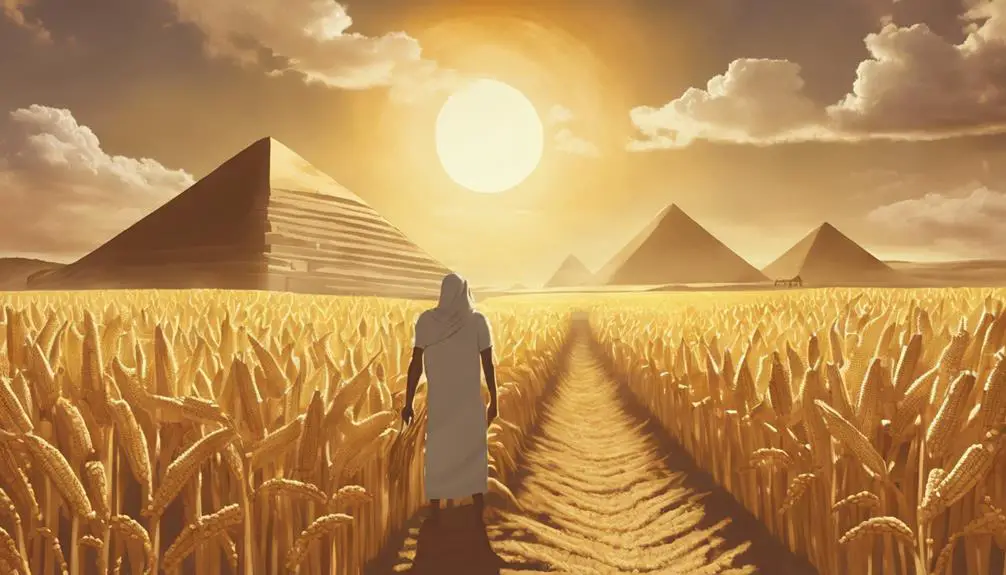
In Joseph's story, the presence of corn emerges as a multifaceted symbol, intricately weaving together themes of providence, perseverance, and ultimate reconciliation. Through Joseph's journey, you'll recognize corn not just as a staple diet but as a profound emblem within the narrative:
- Dream Interpretation: Joseph's ability to interpret dreams, notably Pharaoh's dream of seven fat and seven lean cows, signifies corn as a predictor of economic abundance and famine. This interpretation showcases Joseph's unique gift and sets the stage for his rise to prominence.
- Economic Foresight: The storage of corn during the years of plenty, under Joseph's supervision, reflects exceptional economic foresight. This action saves Egypt and surrounding nations from severe famine, emphasizing the importance of preparation and wise governance.
- Providence: The provision of corn during famine years illustrates divine providence. This aspect highlights how, through Joseph, God provided for His people, ensuring their survival and prosperity.
- Reconciliation: The eventual reunion of Joseph with his brothers, facilitated by their need for corn, symbolizes reconciliation. This moment is poignant, reflecting the overarching theme of forgiveness and restoration.
Analyzing these elements, you'll grasp the deep layers of symbolism corn holds in Joseph's narrative, underpinning themes of faith, foresight, and forgiveness.
Parables Involving Corn
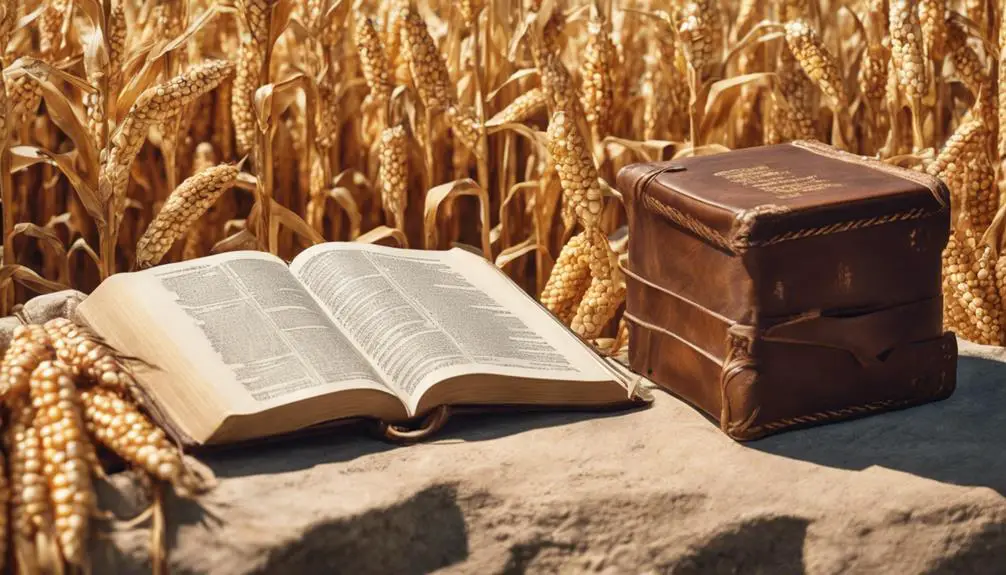
Several parables within the biblical narrative utilize the imagery of corn to convey deeper spiritual lessons and truths. This use of corn's metaphor isn't merely coincidental; it's deeply rooted in the agrarian society in which these texts were written. Through the lens of agricultural teachings, these parables offer profound insights into ethics, community, and the divine.
One notable example is when corn is used to illustrate the principle of growth and potential. Here, the kernel of corn must die to bring forth life, a metaphor for self-sacrifice and the promise of renewal. This imagery invites you to consider the cycles of life and the necessity of transformation for growth.
Additionally, the sowing and reaping of corn serve as metaphors for spiritual sowing and the eventual harvest of one's actions. These teachings emphasize the importance of diligence, foresight, and ethical living. The act of planting corn becomes a symbolic act of faith, underscoring the belief that what you sow, you'll also reap.
Through these parables, you're encouraged to reflect on the values of patience, faith, and hard work. The imagery of corn, rich in agricultural significance, thus becomes a vehicle for conveying timeless spiritual truths.
Harvest Celebrations and Faith
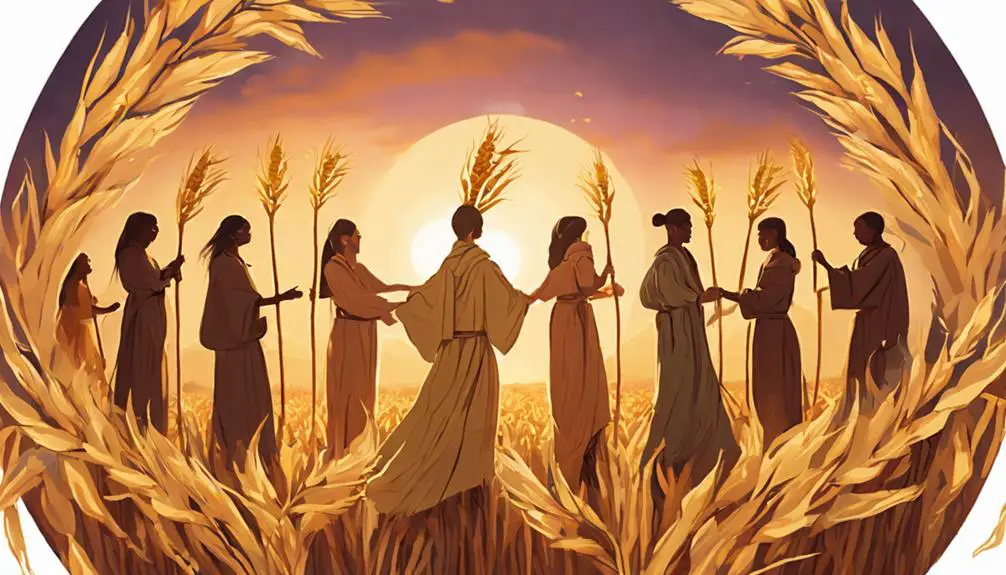
Harvest celebrations, deeply interwoven with faith traditions, mark significant periods of communal thanksgiving and spiritual reflection on the bounty provided by the earth. These observances aren't merely cultural festivities; they embody the intricate relationship between agricultural cycles and spiritual life, particularly in the context of grain festivals.
In analyzing these events, you'll find that:
- Grain Festivals serve as pivotal moments in the liturgical calendar, where communities gather to express gratitude for the harvest. This gratitude is directed not only towards the physical nourishment but also the spiritual sustenance derived from the earth's produce.
- Faith Practices during these celebrations often involve rituals and prayers that seek blessings for future harvests. These practices underscore a reliance on divine providence for the continuation of life and well-being.
- Communal Participation highlights the social aspect of faith, where sharing the bounty becomes a tangible expression of spiritual values and unity.
- Reflection and Renewal are fostered, as participants contemplate the profound connections between the land, their labor, and their spiritual beliefs.
Understanding these elements sheds light on how harvest celebrations go beyond mere acknowledgment of agricultural success; they're a rich tapestry of faith practices, community, and gratitude that resonate deeply within the human spirit.
Interpreting Corn's Spiritual Lessons
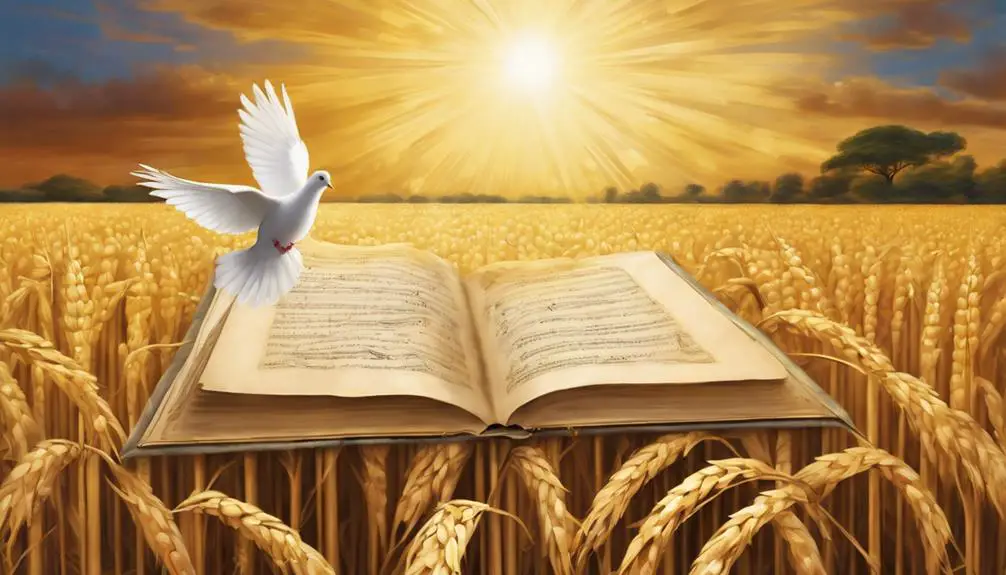
Moving beyond the broader context of grain festivals, it's essential to explore the specific spiritual lessons corn embodies within biblical narratives. Corn metaphors, deeply ingrained in scripture, are rich with spiritual symbolism. They often represent sustenance, prosperity, and the blessings of God, reflecting the integral role of agricultural practices in sustaining life.
You'll find that corn's spiritual lessons are multifaceted. For instance, the process of planting, nurturing, and harvesting corn mirrors the spiritual journey of growth and maturity. Just as a farmer tends to their crops, you're called to nurture your faith with diligence and patience. This parallel underscores the importance of daily spiritual practices in cultivating a deep, enduring faith.
Moreover, the cycle of sowing and reaping with corn is a powerful metaphor for the principle of cause and effect in the spiritual realm. It teaches you that your actions and choices have consequences, both in this life and beyond. This lesson encourages you to sow seeds of kindness, generosity, and love, anticipating the harvest of spiritual fruits in your life and in the lives of others.
In analyzing these corn metaphors within biblical contexts, you gain a deeper understanding of their spiritual significance and how they can guide your faith journey.
Frequently Asked Questions
How Does the Cultivation and Farming Practices of Corn in Ancient Biblical Times Differ From Modern Agricultural Methods?
You'll find that ancient biblical times relied on simpler methods like crop rotation to maintain soil health, contrasting sharply with today's reliance on genetic modification to boost corn yields. Back then, they lacked the technology for such modifications, focusing instead on natural techniques to ensure crop sustainability.
This fundamental shift from traditional to modern agricultural practices highlights how advancements have significantly altered the approach to farming, moving away from solely natural methodologies.
Are There Any Specific Rituals or Prayers Mentioned in the Bible That Involve Corn During Planting or Harvesting Seasons?
You're asking if the Bible mentions specific rituals or prayers involving corn during planting or harvesting seasons.
While direct references to corn symbolism and harvest festivals in the context of rituals or prayers are scarce, the Bible alludes to agricultural celebrations and offerings.
However, it doesn't explicitly detail practices centered around corn.
Instead, it broadly addresses the spiritual significance of thanking God for bountiful harvests, which can be inferred to include crops like corn.
How Has the Symbolic Interpretation of Corn in the Bible Influenced Other Religious Traditions Outside of Christianity?
Ironically, you might think corn's influence stops at the dinner table, but it's reached into the realm of spirituality, affecting religious traditions far beyond Christianity.
Corn deities and festival adaptations in other religions mirror the biblical symbolism of corn, blending ancient reverence with contemporary practices.
This cross-pollination reveals a rich tapestry of cultural exchange, where corn's spiritual significance transcends boundaries, enriching rituals and beliefs across diverse faiths with its universal themes of sustenance and renewal.
Can the Spiritual Significance of Corn in the Bible Be Connected to Environmental Stewardship and Sustainability in Contemporary Discussions?
You can certainly link the spiritual significance of corn to today's environmental stewardship and sustainability debates. Considering corn's role in discussions about climate change and its economic impacts, it's clear that integrating spiritual values can deepen our commitment to the environment.
What Are the Linguistic Origins of the Word "Corn" in Biblical Texts, and How Does This Compare to Its Meaning in Different Cultures and Translations?
Imagine unearthing ancient texts, each word a seed sown from long-ago civilizations. In this quest, you're diving into the origins of 'corn', a term with deep roots in etymology and cultural translations.
'Corn' originally signified 'grain' in Old English, evolving uniquely across cultures. In the Bible, it's often a general term for grains, whereas, in the Americas, it specifically denotes maize. This linguistic journey reflects how words adapt, mirroring the diversity of human experience.
Conclusion
In the tapestry of biblical narratives, corn weaves a golden thread, symbolizing God's unwavering provision and the cyclical nature of faith. Through Joseph's saga and parabolic teachings, it emerges as a beacon of sustenance and hope.
Harvest celebrations further underscore its spiritual significance, inviting believers to reap the lessons sown throughout sacred texts. As you reflect on corn's divine essence, let it illuminate the path of spiritual growth, reminding you that in every grain lies the potential for renewal and abundance.



Sign up